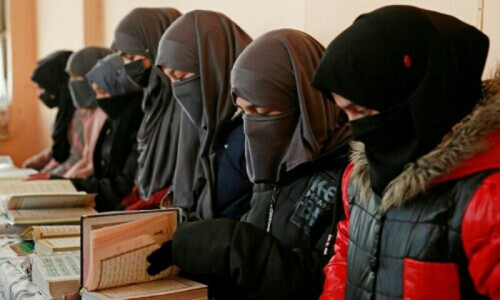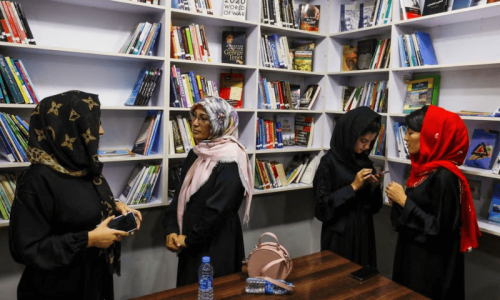UNITED NATIONS: The UN warned on Tuesday that it would pull out of Afghanistan in May if the Afghan Taliban do not allow its local women staff to return to work.
Also on Tuesday, the United Nations Development Programme (UNDP) released a study, which warned that restrictions on women’s rights will worsen economic catastrophe in Afghanistan.
The country’s de facto rulers indicated their inclination to ban Afghan women from working for the UN in December last year. On April 12, they issued a decree saying that Afghan women employed by the UN could no longer report for work. They have rejected UN appeals to review their position.
Special Representative of the Secretary-General for Afghanistan Roza Otunbayeva last week issued a statement, declaring that the UN was launching an operational review to determine whether it can stay in the country despite the ban. The review period expires on May 5.
Says move would be ‘heartbreaking’ but unavoidable if Taliban ban on working women continues
A UN statement explained, “UN national personnel in Afghanistan — both women and men — have been instructed not to report to UN offices” during the review period. But it did make “limited and calibrated exceptions” for those involved in “critical tasks.”
Since their return to power in August 2021, Afghan Taliban have implemented a series of discriminatory measures that restricted Afghan women and girls from participating in most areas of public and daily life.
In one of its statements on the issue, the UN said the de facto Taliban authorities were forcing it “into … making an appalling choice between staying … in Afghanistan (or) standing by the norms and principles we are duty-bound to uphold.”
“It should be clear that any negative consequences of this crisis for the Afghan people will be the responsibility of the de facto authorities,” the statement added.
In another statement on Tuesday, the UN said it was ready to take the “heartbreaking” decision to pull out of Afghanistan in May if Taliban do not allow Afghan women to work for the organisation.
The 3,300 Afghans employed by the UN — 2,700 men and 600 women — have stayed at home since April 12. However, at a recent briefing in New York, UN spokesperson Stéphane Dujarric said the staff would continue to receive payments. The UN’s 600-strong international staff, including 200 women, is not affected by the Afghan Taliban’s edict.
A UNDP study, released on Tuesday, shows that without continuity for girls’ education and women’s ability to work, prospects for recovery of the Afghan economy would remain grim.
The study, “Afghanistan Socio-Economic Outlook 2023”, details how Afghanistan’s economic output collapsed by 20.7 per cent following the Taliban takeover in 2021. And despite tentative signs of recovery, such as a relatively stable exchange rate, an increase in exports, growing demand for labour, and muted inflation, GDP is estimated to have further declined by 3.6pc in 2022.
“A sustained inflow of foreign aid, to the tune of $3.7 billion in 2022, has helped avert the total collapse of Afghanistan,” said UNDP Resident Representative in Afghanistan Abdallah Al Dardari.
“Afghanistan is on the brink of economic collapse, exacerbated with the takeover in August 2021,” said UNDP Administrator Achim Steiner. “Only the continued provision of international aid and basic services to millions of Afghans prevented a full collapse.”
The UN contributed $3.2bn of the overall $3.7bn in foreign aid to Afghanistan last year. UN assistance directly reached 26.1 million Afghans with some form of aid, while helping to stabilise the exchange rate, curb inflation and affect other economic indicators.
The new report projects that the 2023 GDP in Afghanistan could increase by 1.3pc if the level of foreign aid remains at $3.7bn.
However, prospects for economic recovery remain weak and insufficient over the long term, especially if foreign aid is withheld as a result of restrictive Taliban policies.
The UNDP paper analyses the potential impact of a hypothetical aid cut on Afghanistan’s economy and predicts that the decline that would send the country hurtling to the bottom of the global poverty scale.
Published in Dawn, April 19th, 2023
















































Dear visitor, the comments section is undergoing an overhaul and will return soon.